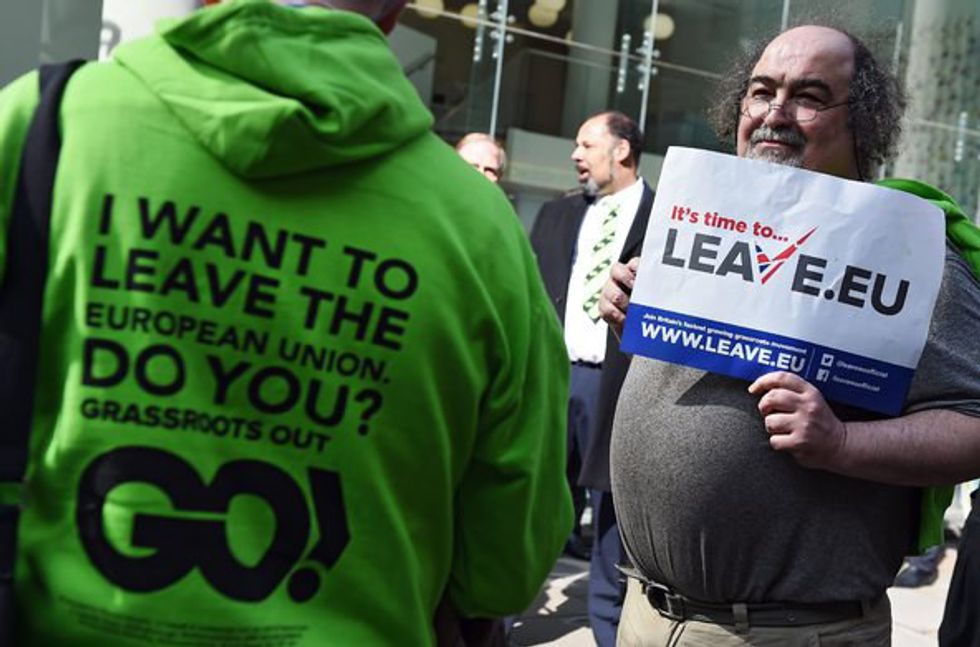On the Thames
A cursory Google search of the "Battle of the Thames" displays a short synopsis of an 1813 battle between the United States and the United Kingdom. This is not 1813. The year is 2016, and a faux naval confrontation on the Thames has exemplified current British politics.
A flotilla of Scottish fishermen, pro-Brexit supporters, flooded the River Thames on June 15, led by the United Kingdom Independent Party leader, Nigel Farage, in a show of naval strength. By the time the flotilla reached London’s 19th century Tower Bridge, an armada of “remain” supporters ambushed them. Led by British rock star Bob Geldof, the ensuring battle then dissolved into exchanges of blasts of water, blaring music and furious yelling. Onlookers and participants took to Twitter, effectively trading barbs and renaming the encounter "The Battle of the Thames."
BREAKING: The state of British politics summed up in a clip of a flotilla face-off pic.twitter.com/rCe5Ouej3F
— Kaya Burgess (@kayaburgess) June 15, 2016
Farage originally took to the water to allow Scottish fishermen to voice their dissatisfaction with Britain’s partnership with the European Union. Geldof disagreed. “[Farage] face the facts,” He blared from his vessel, drowning out Farage’s own sound system. “One, Britain makes more money than any other country in Europe from fishing. Two, Britain has the second largest quota for fish in Europe after Denmark. Three, Britain has the third largest landings. Four, you are no fisherman’s friend.”
I'm under aural attack from Bob Geldof who has the loudest soundsystem known to man and is haranguing Farage. pic.twitter.com/fNfojKs3AK
— Jim Waterson (@jimwaterson) June 15, 2016
Geldof commanded a smaller fleet but sported a much larger sound system, on which he occasionally lectured against Farage. Farage’s flotilla responded similarly, and a smaller fishing boat even attempted to board Geldof’s ship. As the two parties continued to circle each other, the Harbor Master eventually requested the vessels reduce their volume. Police then soon dispatched to keep the rival flotillas separated right outside Parliament (who were discussing the issue driving this battle).
The Buildup
On June 23, Britain will hold a referendum to decide if they will leave the European Union, also known as Brexit. Britain has been a member of the European Union since 1973. Their last referendum was in 1975, when more than 67 percent of Brits voted in favor. As one of the biggest political decisions of the decade, this can have a profound impact on international economy and dynamic as recent polls mark a decline in the opposition to Brexit. Should Brexit be successful, Britain would have two years to negotiate a settlement with the European Union, mostly concerning their trade status.
The ‘remain’ party is headed by Prime Minister David Cameron, who is supported by most of the Conservative government, the Labour Party, the Liberal Democrats and the Scottish National Party. Large businesses, Britain’s intelligence services, President Obama, Chancellor Angela Merkel of Germany and President Xi Jinping of China also support the Prime Minister. This party mainly argues that Britain needs to stay associated with the large bloc to maintain their influence and security in the world.
The Brexits are led by Michael Grove and Boris Johnson. They are supported by some of the Conservative members of the Parliament, the U.K. Independence Party and their leader, Nigel Farage. As a counterargument, they argue that the European Union’s shrinking size and influence is diminishing Britain’s influence. Their main argument also includes sovereignty and immigration.
Economists on both sides agree that leaving the bloc would result in a weakened economy, although pro-Brexit claims that Britain would be better off by 2030.









































